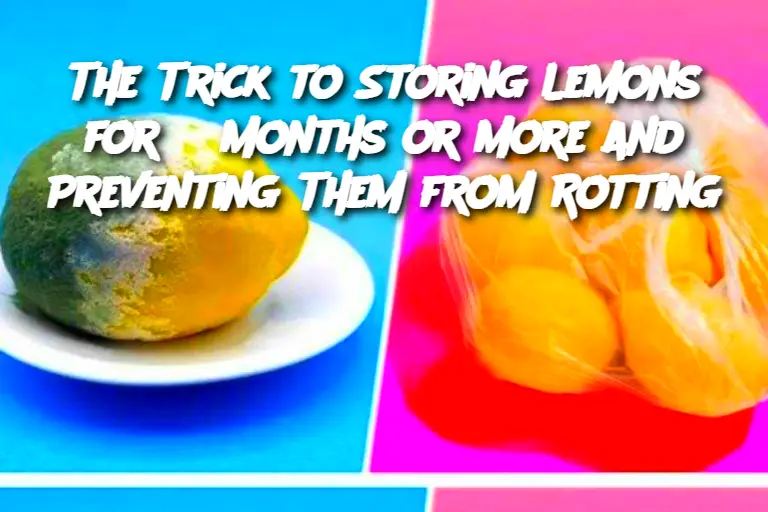ADVERTISEMENT
Introduction
Lemons are versatile fruits that add a burst of flavor to both savory and sweet dishes. However, they often spoil too quickly, leaving us with fewer options than we'd like for incorporating them into our meals. What if there was a way to extend their shelf life for three months or more, ensuring you always have fresh lemons on hand when you need them? In this article, we’ll dive into effective strategies for storing lemons to prevent them from rotting, allowing you to enjoy them well beyond their typical shelf life.
Ingredients:
Fresh lemons (as many as you'd like to store)
Salt (for a preservation method)
Water (for storage solution)
A jar or airtight container (depending on your chosen method)
Preparation:
Method 1: The Salt Preservation Method (for up to 3-6 months)
Start by washing your lemons thoroughly to remove any dirt or pesticides.
Cut a small slit in each lemon, ensuring you don’t cut all the way through.
Fill the slit with coarse salt, pressing it in firmly.
Pack the lemons tightly into a jar or airtight container.
Once the jar is filled, cover the lemons with more salt, pressing them down to eliminate air pockets.
Pour water into the jar to cover the lemons completely. Seal the jar tightly.
Store in a cool, dark place. After a few days, you can begin using the preserved lemons.
Method 2: Freezing Whole Lemons (up to 6 months)
Rinse the lemons and dry them thoroughly.
You can either store them whole in the freezer or cut them into wedges or slices, depending on how you plan to use them later.
For whole lemons, simply place them in a freezer-safe bag or container. If you prefer slices, lay them out on a baking sheet and freeze individually before transferring to a storage bag.
Frozen lemons can be grated directly from the freezer or thawed as needed.
Method 3: Storing in Lemon Juice (up to 3 months)
Juice your fresh lemons and pour the juice into ice cube trays.
Once the juice is frozen into cubes, transfer them to a freezer-safe container or bag for long-term storage.
Lemon juice cubes can be used in cooking, beverages, or even as a quick way to refresh your dishes.
Presentation and Storage Tips:
When Using Preserved Lemons: After you’ve preserved your lemons using the salt method, the lemons will develop a tangy, pickled flavor that’s perfect for use in Moroccan, Mediterranean, and Middle Eastern dishes. These preserved lemons can be chopped up and added to stews, sauces, salads, or even eaten as a garnish.
When Freezing Whole Lemons: If you freeze lemons whole, you can use them directly from the freezer. Grate the lemon zest over dishes, or cut frozen lemon wedges to squeeze into drinks or recipes. Alternatively, thaw the entire lemon and juice it for fresh lemon juice.
Storage Conditions: Whichever method you choose, make sure your lemons are stored in airtight containers to prevent freezer burn or exposure to light. Always label your containers with the date they were stored to ensure you use them within the suggested time frame.
Variation:
ADVERTISEMENT
